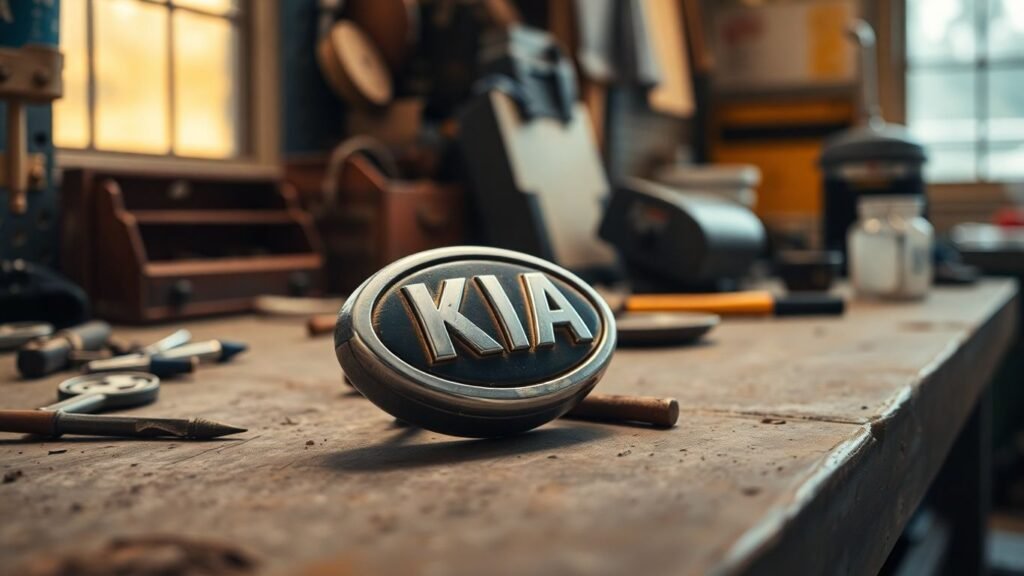Finding parts for older or less common Kia models can feel like a real quest. It’s not always straightforward, and sometimes you might think you’ll never find that specific piece you need. But don’t worry, the adventure of finding rare Kia spare parts is totally doable. It just takes a bit of know-how and a willingness to look in some unexpected places. This guide is here to help you on that journey, making the search a little less daunting and a lot more rewarding.
Key Takeaways
- Figuring out which Kia parts are hard to find is the first step. Some models and specific components are just rarer than others.
- Online spaces like Kia forums and big marketplaces are great places to start your search for those hard-to-get parts.
- Connecting with other Kia fans and collectors can lead you to parts you wouldn’t find on your own.
- Don’t forget about old-school methods like checking scrapyards or talking to independent mechanics; you never know what you might find.
- Once you find a part, make sure it’s the real deal and in good shape before you buy it to avoid problems later.
Navigating The Landscape Of Rare Kia Parts
Finding those specific, hard-to-come-by parts for your Kia can feel like a real treasure hunt. It’s not always straightforward, especially with older models or less common trims. Some parts just aren’t made anymore, and that’s where the challenge really begins. The scarcity of certain components is often tied to the production numbers and lifespan of particular Kia models.
Understanding The Rarity Of Specific Kia Components
When a car model stops being produced, the factory stops making its parts. Over time, the parts that were made get used up, break, or get lost. This is especially true for parts that wear out, like engine components, suspension parts, or even interior trim pieces that get a lot of use. Some parts might have been made in smaller batches to begin with, making them rare from the start. Think about special edition models or performance variants; they often had unique parts that weren’t shared with the standard versions. These unique parts are naturally going to be harder to find once the car is no longer in production.
Identifying Key Models For Hard-To-Find Parts
Certain Kia models are more likely to have parts that are difficult to source. Generally, these are older vehicles, especially those from the late 1980s and 1990s, as Kia’s presence in many markets was still growing then. Models like the original Kia Sportage, the early Sephia, or even some of the less common sedans from that era can be tricky. Performance versions or limited runs of popular models can also be a source of rare parts. If you’re looking for something specific, it’s often helpful to research which models had the most limited production runs or were known for unique features.
The Role Of Vintage Kia Models In Part Scarcity
Vintage Kias, those classic models that enthusiasts love to restore, are a prime example of part scarcity. These cars, often decades old, have had their original parts degrade or disappear over time. Finding original body panels, specific interior pieces, or even engine parts for a 1970s or 1980s Kia can be a significant undertaking. The fewer of these cars that were originally sold, and the more that have been lost to time or accidents, the rarer their parts become. It’s a simple supply and demand situation, but with a heavy dose of nostalgia and passion driving the demand.
The journey to find rare Kia parts often involves understanding the history of the models and the typical wear and tear associated with them. It’s about knowing which pieces are most likely to be missing or broken and which car lines are most prone to this scarcity.
Leveraging Online Resources For Your Quest

Finding those hard-to-get Kia parts can feel like a treasure hunt, and thankfully, the internet is your best map. It opens up a world beyond your local mechanic’s shop or the usual auto parts store. You just have to know where to look.
Specialized Kia Forums And Enthusiast Communities
These online hangouts are goldmines. People who are just as passionate about Kias as you are often gather here. They share tips, stories, and most importantly, they know where to find obscure parts. You’ll find discussions about specific models, common issues, and often, someone will have a lead on a part you’ve been searching for. Don’t be shy about posting a request; the community is usually happy to help a fellow enthusiast. It’s a great way to connect with people who understand the struggle and can point you in the right direction.
Online Marketplaces For Used And Discontinued Parts
Websites dedicated to selling used car parts are a fantastic resource. Think of them as digital junkyards. You can often find original parts from vehicles that have been dismantled. It takes patience, as inventory changes constantly, but you might stumble upon exactly what you need. Some sites even specialize in older or classic car parts, which is perfect for those rare Kia components.
Global E-commerce Platforms For International Finds
Don’t limit your search to your own country. Large e-commerce sites can connect you with sellers worldwide. This is especially useful if a particular part was more common in another region or if it’s a model that wasn’t widely sold where you are. Be mindful of shipping costs and import duties, but the expanded reach can be well worth the effort. You might find that a part that’s incredibly rare locally is readily available across the ocean.
The internet has truly leveled the playing field for car enthusiasts. What once required extensive travel and word-of-mouth connections can now often be found with a few clicks. It’s about persistence and knowing how to search effectively.
Here’s a quick look at what you might expect to find:
| Part Type | Common Online Source | Likelihood of Finding Rare Parts |
|---|---|---|
| Engine Components | Specialized Forums, eBay | Moderate |
| Body Panels | Online Marketplaces, Facebook Groups | Low to Moderate |
| Interior Trim | Used Parts Websites, Enthusiast Forums | Moderate |
| Obsolete Electronics | Global E-commerce, Niche Websites | Low |
Connecting With The Kia Collector Network
Finding those elusive Kia parts can feel like a treasure hunt, and sometimes, the best maps are held by other enthusiasts. Tapping into the network of Kia collectors is a smart move. These folks have often been down the same road, hunting for the same rare bits and pieces. They know where to look, who to ask, and sometimes, they even have the part you need stashed away.
Attending Kia Enthusiast Meets And Shows
Car shows and meetups focused on Kia vehicles are goldmines for connecting with fellow owners. It’s not just about admiring the shiny paint jobs; it’s about the conversations that happen in the parking lot. You’ll find people who are passionate about specific models, maybe even the exact one you’re restoring. Don’t be shy – strike up a conversation. Ask about their car, how they found certain parts, or if they know anyone who might have what you’re looking for. You might be surprised at how willing people are to share their knowledge and contacts.
Building Relationships With Other Collectors
Think of it like building a rolodex, but for car parts. When you meet someone at a show or online who shares your passion, try to keep that connection going. A simple follow-up message or an invitation to a local cruise-in can turn a casual acquaintance into a reliable source. These relationships are built on mutual respect and a shared love for keeping these cars on the road. The more people you know in the Kia community, the wider your net for finding parts becomes.
The Value Of Word-Of-Mouth In Part Discovery
In the world of rare parts, word-of-mouth is still king. If you’re looking for a specific trim piece for a vintage Kia Pride, and you mention it to a few people you’ve met, chances are that information will travel. Someone might know someone who has one sitting in their garage, or they might hear about a car being parted out. It’s a slow burn, but it’s incredibly effective. Keep your ears open and let people know what you’re searching for.
Sometimes, the most unexpected conversations lead to the biggest breakthroughs. Don’t underestimate the power of a casual chat at a gas station or a quick question posted on a forum. These small interactions can snowball into finding exactly what you need.
| Type of Event | Potential for Part Discovery | Networking Opportunity | Notes |
|---|---|---|---|
| Local Kia Meet | Moderate | High | Good for local connections |
| Regional Car Show | Moderate | Moderate | Broader audience, more diverse cars |
| Dedicated Kia Rally | High | High | Focused on Kia, passionate attendees |
| Online Forum Thread | High | High | Accessible anytime, global reach |
Exploring Physical Avenues For Parts

Sometimes, the old-school methods are the best when you’re hunting for those hard-to-find Kia parts. While the internet is great, there’s a certain thrill in physically digging through piles of metal or talking face-to-face with someone who might have exactly what you need. It takes patience, a bit of luck, and a willingness to get your hands a little dirty, but the rewards can be immense.
Scrapyards and Salvage Yards as Treasure Troves
Think of scrapyards and salvage yards as the forgotten archives of the automotive world. These places are packed with vehicles that have reached the end of their road, but for an enthusiast, they’re goldmines. You might find a rare trim piece, a specific engine component, or even a whole assembly that’s no longer produced. It’s a bit like a treasure hunt; you never know what you’ll uncover. The key is to be systematic and know what you’re looking for. Don’t just wander aimlessly. Have a list, and be prepared to spend time sifting through the inventory. Some yards are organized, while others are more chaotic, so a good attitude and a keen eye are your best tools.
| Part Type | Potential Availability | Condition Assessment | Negotiation Tips |
|---|---|---|---|
| Body Panels | Moderate | Surface rust, dents | Check for structural integrity, compare prices |
| Engine Components | Low to Moderate | Wear, leaks, damage | Ask about the vehicle’s history, test if possible |
| Interior Trim | Moderate to High | Fading, cracks, tears | Look for complete sets, check for UV damage |
| Wheels/Tires | Moderate | Curb rash, tread wear | Inspect for bends or cracks, check tire age |
Visiting a salvage yard requires a certain mindset. You’re not just buying a part; you’re rescuing it. Be respectful of the yard owners and staff, and always prioritize safety. Wear sturdy shoes and gloves, and be aware of your surroundings. It’s a place of potential, but also of hazards.
Independent Kia Specialists and Garages
Beyond the general scrapyards, there are independent garages and specialists who focus on specific makes, including Kia. These folks often have a deep knowledge of older models and might even keep a stock of parts for vehicles that are no longer supported by the main dealerships. They might have sourced parts from other enthusiasts, or perhaps they’ve kept them from vehicles they’ve worked on over the years. Building a rapport with these specialists can be incredibly beneficial. They can be a great source of information, and sometimes, they’ll even keep an eye out for parts they know you’re searching for. Don’t be afraid to ask them about their inventory or if they know anyone else who might have what you need.
The Art of Negotiation at Auto Auctions
Auto auctions, especially those that deal with older or specialty vehicles, can be another avenue for finding rare Kia parts. While you might be bidding on a whole car, sometimes you can find parts being sold separately, or you might be able to acquire a vehicle solely for its parts. This requires a different skill set. You need to be able to assess value quickly and understand the market. Negotiation here is often about bidding strategy rather than haggling. Know your maximum price beforehand and stick to it. Auctions can be exciting, but they can also lead to overspending if you get caught up in the moment. Researching the typical prices for the parts you need beforehand is a smart move.
Authenticating And Verifying Your Finds
So you’ve tracked down that elusive part, maybe from a dusty corner of a salvage yard or a seller halfway across the world. That’s awesome! But before you get too excited, we need to talk about making sure what you’ve got is the real deal and actually usable. It’s like finding a rare comic book – you gotta check the condition and make sure it’s not a fake.
Recognizing Genuine Kia Parts
This is where you become a bit of a detective. Genuine Kia parts usually have specific markings. Look for the Kia logo, part numbers, and sometimes even a "Made in Korea" stamp. These aren’t always obvious, and sometimes older parts might have faded markings. You can often cross-reference part numbers online or with a Kia dealership’s parts department if you’re really unsure. A part that feels too light or has a flimsy construction is often a red flag. Sometimes, the packaging itself can tell you a lot – official Kia packaging is usually well-made and has clear branding.
Assessing the Condition of Used Components
When you get a used part, you can’t just slap it in. You need to give it a good once-over. For mechanical parts, check for excessive wear, cracks, or signs of damage. Does it spin freely? Are there any strange noises? For body panels, look for rust, dents, or previous repair work that might not hold up. Even something like a headlight assembly needs to be checked for cracked lenses or corroded connectors. It’s always a good idea to ask the seller for detailed photos or even a short video of the part in action, if possible.
Avoiding Counterfeit or Substandard Parts
This is a big one, especially with popular or rare items. Counterfeit parts are made to look like the real thing but are often of much lower quality. They might not fit correctly, could fail prematurely, and in some cases, can even be dangerous. Be wary of prices that seem too good to be true. If a seller is vague about the part’s origin or history, that’s another warning sign. Stick to reputable sellers and sources whenever you can. If you’re buying online, check seller reviews and ratings carefully.
Sometimes, the best way to know if a part is legit is to compare it side-by-side with a known genuine part, even if it’s just a picture online. Look at the details – the texture of the plastic, the precision of the stamping, the way the edges are finished. These small things can make a big difference in spotting a fake.
Here’s a quick way to think about it:
| Feature | Genuine Kia Part | Potential Counterfeit/Substandard |
|---|---|---|
| Markings/Logos | Clear, precise | Blurry, incorrect, or missing |
| Material Quality | High | Low, brittle, or flimsy |
| Fit and Finish | Exact | Poor, requires modification |
| Price | Market standard | Unusually low |
| Seller Reputation | Good | Poor or unknown |
The Long-Term Value Of Rare Kia Parts
Finding those hard-to-get Kia parts isn’t just about fixing a broken car; it’s about preserving a piece of automotive history. When you track down a rare component for your classic Kia, you’re doing more than just completing a repair. You’re keeping a specific model alive and well, which is pretty cool when you think about it. These parts can really make a difference in how a car looks and performs, especially for older models that aren’t made anymore.
Preserving The Integrity Of Your Classic Kia
For anyone who loves their vintage Kia, keeping it original is often the main goal. Using genuine or period-correct parts is key to maintaining that authentic feel. It’s like keeping the soul of the car intact. When you replace a worn-out original part with a reproduction or something that just doesn’t quite fit, it can change the whole character of the vehicle. Finding the right, rare part means your Kia stays true to its original design and engineering, which is what enthusiasts really appreciate. It’s about respecting the car’s heritage.
The Investment Potential Of Scarce Components
Sometimes, these rare parts can actually become valuable in their own right. Think about it: if a certain part is super hard to find, and a lot of people need it for their restorations, its price can go up. It’s basic supply and demand, really. A part that was once common but is now scarce can turn into a decent little investment. It’s not like buying stocks, but for car folks, it’s a tangible asset that can grow in worth.
| Part Type | Estimated Value Increase (Year-over-Year) |
|---|---|
| Original Engine Components | 5-10% |
| Rare Interior Trim Pieces | 8-15% |
| Discontinued Exterior Badges | 10-20% |
| Specific Model Year Wheels | 7-12% |
Ensuring The Longevity Of Your Kia Ownership Experience
Having access to these hard-to-find parts means you can keep your Kia running smoothly for a lot longer. It’s not just about the immediate fix; it’s about the future. When you can source the correct parts, you avoid making compromises that might cause other problems down the line. This means you can enjoy your Kia for years, maybe even decades, to come. It’s about building a lasting relationship with your car, rather than just a temporary fix.
The satisfaction of finding that one elusive part for your beloved Kia is immense. It’s a testament to your dedication as an owner and collector, ensuring that these vehicles continue to be appreciated and enjoyed for generations to come. It’s about more than just metal and mechanics; it’s about passion and preservation.
The Hunt Continues
So, you’ve gone through the steps, learned a bit about where to look, and maybe even found that elusive piece you’ve been chasing. It’s not always easy, and sometimes it feels like you’re digging through a mountain of old parts. But when you finally track down that rare bit for your Kia, the satisfaction is pretty great. It’s more than just fixing a car; it’s about keeping a piece of automotive history alive and making your ride truly yours. Keep at it, fellow enthusiasts – the next rare find is always out there, waiting for someone dedicated enough to find it.








